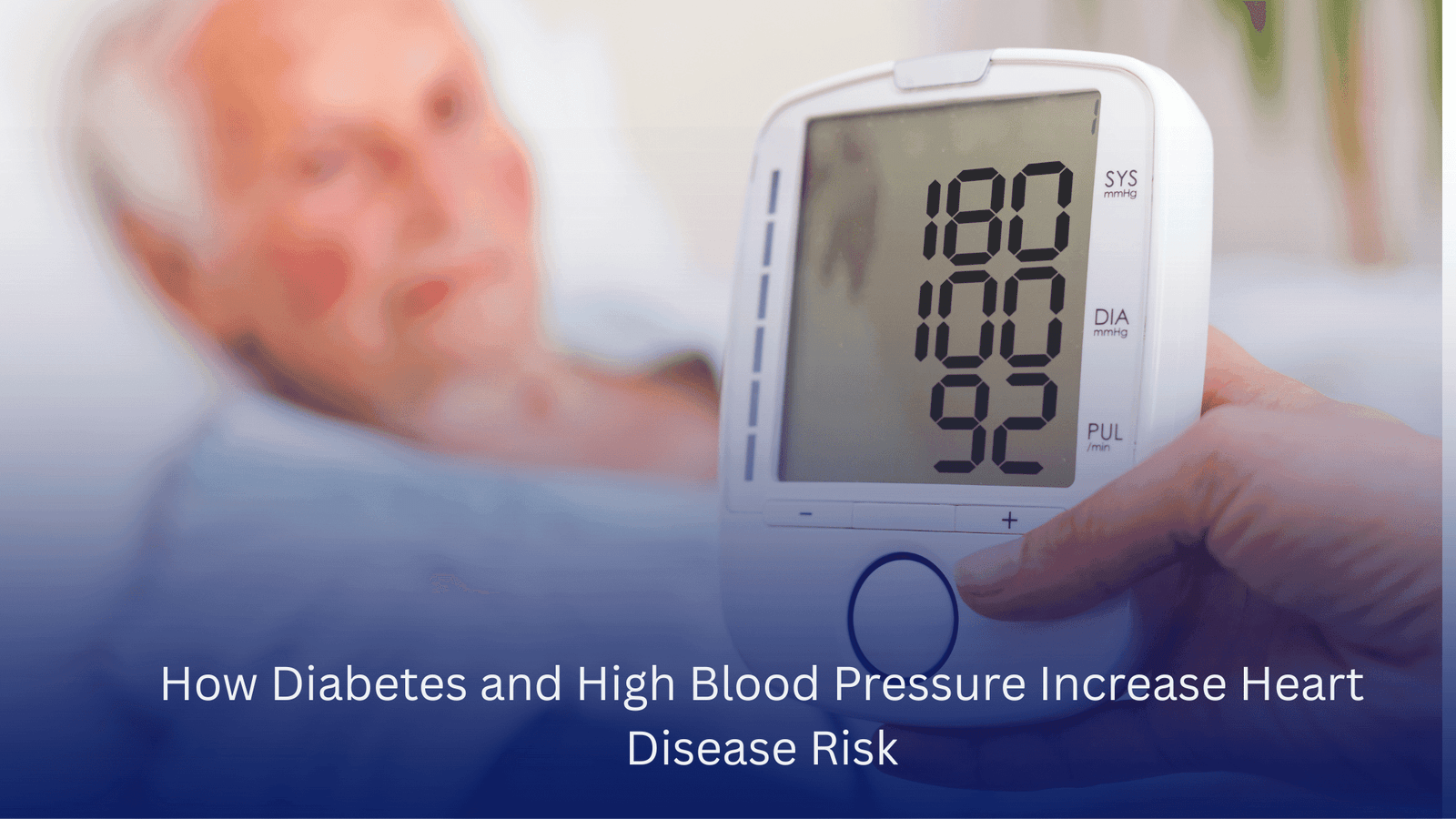Diabetes, Blood Pressure & Heart Disease Risk
Heart disease remains one of the leading causes of death globally, and its connection with other health conditions such as diabetes and high blood pressure (hypertension) is well established. If you or your loved ones suffer from diabetes or high blood pressure, it is crucial to understand how these conditions increase the risk of heart disease and what you can do to protect your heart.
In this comprehensive guide, we will explore:
- What diabetes and high blood pressure are
- How each condition affects the heart
- Why they increase the risk of heart disease
- Signs and symptoms to watch for
- Prevention and management strategies
Understanding these links will empower you to take control of your health and reduce the risk of serious heart complications.
What Is Diabetes?
Diabetes mellitus is a chronic condition characterized by high blood sugar (glucose) levels. It occurs when the body either does not produce enough insulin (Type 1 diabetes) or cannot effectively use the insulin it produces (Type 2 diabetes). Insulin is a hormone that helps glucose enter the cells to be used as energy.
Over time, high blood sugar damages various organs and systems, including blood vessels and nerves, leading to severe complications if left uncontrolled.
What Is High Blood Pressure?
High blood pressure, or hypertension, is a condition in which the force of blood pushing against the walls of your arteries is consistently too high. Normally, blood pressure fluctuates depending on activity and rest, but when it remains elevated over time, it puts extra strain on your heart and blood vessels.
Hypertension is often called the “silent killer” because it typically shows no symptoms until significant damage has occurred.
How Diabetes and High Blood Pressure Affect the Heart
Both diabetes and high blood pressure independently cause damage to the cardiovascular system, but when combined, they multiply the risk.
Impact of Diabetes on the Heart
- Blood Vessel Damage
High blood sugar levels damage the inner lining of arteries (endothelium), making them less flexible and more prone to plaque buildup (atherosclerosis). - Increased Risk of Coronary Artery Disease
Plaque buildup narrows the arteries supplying blood to the heart muscle, reducing oxygen supply and increasing the risk of chest pain (angina) and heart attacks. - Nerve Damage
Diabetes can cause neuropathy, which may mask heart attack symptoms, delaying diagnosis and treatment. - Heart Muscle Changes
Diabetes can lead to a condition called diabetic cardiomyopathy, where the heart muscle becomes stiff or weak, leading to heart failure.
Impact of High Blood Pressure on the Heart
- Increased Workload
High blood pressure forces the heart to work harder to pump blood, leading to thickening of the heart muscle (left ventricular hypertrophy), which can reduce its efficiency. - Damage to Arteries
Elevated pressure damages arteries, promoting plaque formation and increasing the risk of blockages. - Increased Risk of Heart Failure
The added stress can eventually weaken the heart, leading to heart failure. - Risk of Arrhythmias
Hypertension increases the likelihood of irregular heartbeats, which can be dangerous.
Why Diabetes and High Blood Pressure Together Increase Heart Disease Risk More
When diabetes and high blood pressure coexist, they accelerate the damage to the heart and blood vessels:
- Synergistic effect on artery damage: Both conditions promote atherosclerosis faster than either alone.
- Higher risk of clot formation: Damaged arteries and altered blood components increase the likelihood of blood clots.
- Increased inflammation: Both conditions contribute to chronic inflammation, worsening cardiovascular disease.
- Complicated management: Controlling both conditions simultaneously is more challenging, requiring strict adherence to medication and lifestyle.
According to studies, people with both diabetes and hypertension have a two to four times higher risk of heart disease compared to those without these conditions.
Recognizing the Signs and Symptoms
Because heart disease can develop silently, it’s important to be vigilant if you have diabetes or high blood pressure. Watch for:
- Chest pain or discomfort
- Shortness of breath
- Fatigue or weakness
- Swelling in legs or ankles
- Irregular heartbeat
- Dizziness or fainting
- Sudden unexplained sweating or nausea
If you experience any of these symptoms, seek medical attention immediately.
Prevention and Management: Protecting Your Heart
Managing Diabetes
- Control Blood Sugar: Regular monitoring and medication adherence are key.
- Healthy Diet: Emphasize whole grains, vegetables, lean protein, and healthy fats. Limit sugar and refined carbs.
- Regular Exercise: Helps improve insulin sensitivity and cardiovascular health.
- Regular Checkups: Monitor blood sugar, kidney function, and heart health.
Managing High Blood Pressure
- Regular Monitoring: Keep track of your blood pressure readings.
- Medications: Take antihypertensive drugs as prescribed.
- Reduce Salt Intake: Limit sodium to help lower blood pressure.
- Exercise: Aerobic activities can help reduce blood pressure.
- Stress Management: Techniques such as meditation can be beneficial.
Lifestyle Changes for Both Conditions
- Quit Smoking: Smoking exacerbates cardiovascular damage.
- Maintain Healthy Weight: Obesity worsens both diabetes and hypertension.
- Limit Alcohol: Drink in moderation.
- Manage Stress: Chronic stress raises blood pressure and affects blood sugar control.
- Adequate Sleep: Poor sleep negatively affects both conditions.
The Importance of Regular Medical Care
Routine health checkups can detect early signs of heart disease. Your doctor may recommend:
- Blood tests for cholesterol, blood sugar, and kidney function
- ECG or echocardiogram to assess heart function
- Stress tests or imaging to detect blocked arteries
Early intervention can prevent progression and improve quality of life.
Conclusion
Diabetes and high blood pressure are powerful risk factors for heart disease, and when combined, they significantly increase your risk. However, with proper management, lifestyle changes, and medical care, you can protect your heart and live a healthier life.
Stay informed, monitor your health, and consult your healthcare provider regularly to manage these conditions effectively.

